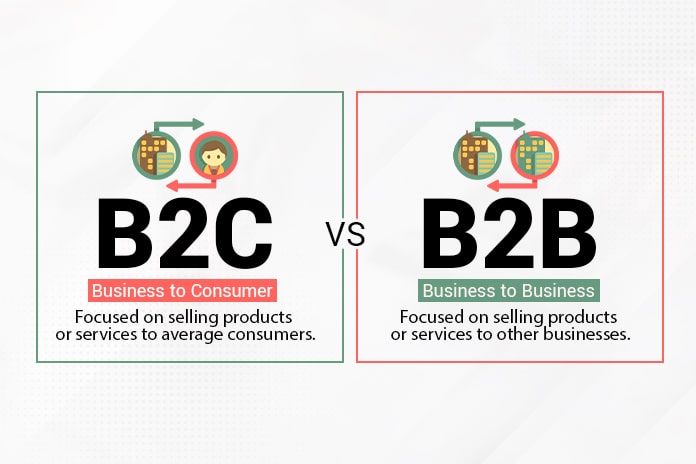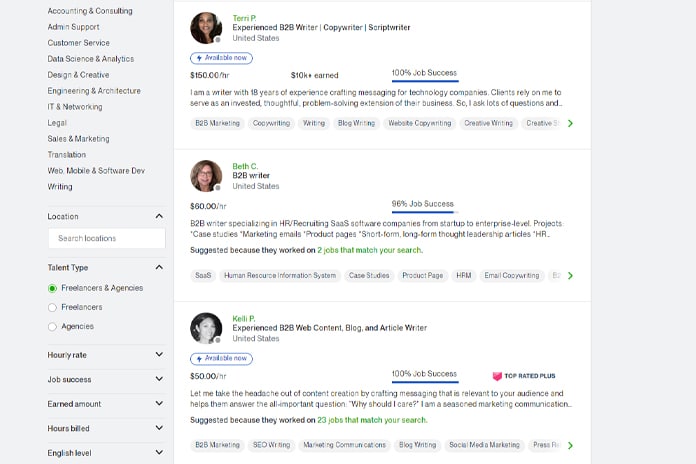Writing is writing, and blogging is blogging, right? How much variance can there really be when your core concept is "a piece of writing meant to build authority or sell a product to an audience"?
In reality, there's a lot that goes into the creation of content, much of it behind the scenes. When you read a blog post online, you see the results of the labor, but you don't see all of the work that went into getting there. You don't see the keyword research, the audience definitions, the content scope, the brief, or any of the rest of the groundwork.
In fact, a huge part of content writing – and something that separates mediocre writers from great writers – is a focus on a target audience.
After all, when you're producing content, you have to know who you're writing to, don't you?
The way you write an email to your boss and the way you send a text message to a friend will be pretty different. So, too, will the blog posts you write targeting different kinds of audiences.
 When you drill down, you have a lot of specifics to consider about audience and buyer personas, demographics and income levels, and all the rest. But, at the very top level, you have one major factor that influences all the rest: are you B2B or B2C?
When you drill down, you have a lot of specifics to consider about audience and buyer personas, demographics and income levels, and all the rest. But, at the very top level, you have one major factor that influences all the rest: are you B2B or B2C?This isn't really a decision you make for your blog. It's more of a natural consequence of the business you run. What do the two terms mean?
B2C writing is often fairly personal, focusing more on emotions and concerns an average person might have, like the nutrition of a food or the price of a service.

 B2C is Business to Consumer. When you see a television commercial advertising new metal roofs or lawn care services or breakfast cereal, that's business (the producer of the product) to consumer (you).
B2C is Business to Consumer. When you see a television commercial advertising new metal roofs or lawn care services or breakfast cereal, that's business (the producer of the product) to consumer (you).The thing is, consumers aren't the only ones who buy things. Businesses buy things as well. How do you think businesses find the things to buy? Well, a lot of different ways. Some of them see TV commercials on channels that are more focused on business owners. Many see a lot of web advertising. Often, direct sales calls, presentations at trade shows, and other channels come into play as well.
Most often, though? It's just good, old-fashioned blogging.
The people making purchase decisions for a business are, in fact, real people. Those people know their business has a need for something, whether it's a new Applicant Tracking System, a new Support and Ticketing system, a Payroll Processor, or what have you. So, they go looking online for information about those systems, and they find blog posts about them.
 Those blog posts are B2B, or Business to Business. It's a different style of business; rather than selling a product to individuals, you sell a product to businesses.
Those blog posts are B2B, or Business to Business. It's a different style of business; rather than selling a product to individuals, you sell a product to businesses.B2B commerce is different from B2C commerce. You often have smaller lists of clients, but larger lists of products or services. An individual might go to an office store and buy a ream of paper for their home printer; a business might set up monthly orders for boxes of paper for their office with seven industrial printers/copiers. It's a matter of scale.
Scale applies to audience as well. When you're marketing a box of cereal, you're aiming at an individual adult to make the decision to buy that cereal. When you're marketing an enterprise-grade timeclock platform, you need to make a convincing argument aimed at many, possibly even dozens of people, who all have a say in the decision-making process.
B2B writing addresses specific individuals, those who own businesses or who are in positions within businesses to make purchasing decisions. The audience is narrower, but no less human, so many of the same narrative techniques like appeals to emotion still work.
 The biggest difference is that business decision-makers like to have a lot of tangible information on hand. They're also a lot more likely to be comparing the cost/benefit layout between different competitors.
The biggest difference is that business decision-makers like to have a lot of tangible information on hand. They're also a lot more likely to be comparing the cost/benefit layout between different competitors.In B2C, you might see half a dozen different cereal advertisements before breakfast, but chances are you're not going to be looking at them from a cost-per-bowl perspective, and you aren't generally going to be comparing the nutritional facts. You're going to be looking at flavors and textures.
With a business platform, the decision-maker will be looking at things like the monthly cost of the product, the number of team members it supports, limits on usage or caps on service, API access, and other tangible details. The "flavor" of a product, the graphic design and the irreverent copy and the use of emojis in ads; it's all irrelevant.
B2B writing also does more than just blog posts. B2B writers may be responsible for white papers, case studies, newsletters, landing pages, and potentially even multimedia content like infographics and video scripts. Some may write speeches, presentations, or social media posts as well.

Businesses have unique needs and unique concerns. A good B2B writer needs to know those concerns, to think in terms of business decisions, not impulsive purchases made by a frazzled mom in a check-out lane.
Thus, most business-focused content is aimed at a specific kind of sales process. It portrays a problem that businesses face, discusses the problem inside and out so whoever is reading the content knows that the writer knows what they're talking about, and then brings up the product as the solution to the problem.
It's all about building trust, authority, thought leadership, and a position of expertise. Price may or may not even be a concern, and when it is, a B2B writer needs to know what scale of pricing is relevant to what level of business.
Every business out there has a target audience. If the business sells to individuals, they're B2C. If they sell to other businesses, they're B2B. Often, the primary difference between them is just a matter of scale, though obviously, certain kinds of products are only relevant to businesses.
Anyone with a printer needs paper and ink, but individuals don't need software to manage employee payroll or timeclocks.
This question is pretty simple, actually.
 Are you a business owner, entrepreneur, or individual trying to sell something to businesses? If so, then you can use a B2B writer.
Are you a business owner, entrepreneur, or individual trying to sell something to businesses? If so, then you can use a B2B writer.Consider your target audience. Do you need to convince an individual to buy a product, or do you need to convince a CEO or Director to buy your product?

Businesses are often in the market for consumer goods as well, but you aren't likely to hire a B2B writer for them. Every business break room has coffee in it, but coffee companies aren't often writing marketing copy directed to businesses. Except, that is, for the ones that do.
So, it all comes down to who you're trying to sell to. If you're going to be targeting businesses, a B2B writer can help you get there.
If you're in the market for B2B writing and you want to get a writer to produce content for you, you have three options.
 The first option is to find a specialist writer who has experience in your industry and as a B2B writer. These writers often command a premium because they have extensive experience and knowledge. They're good at what they do, and they'll definitely help you succeed, but you'll be paying a pretty penny for it.
The first option is to find a specialist writer who has experience in your industry and as a B2B writer. These writers often command a premium because they have extensive experience and knowledge. They're good at what they do, and they'll definitely help you succeed, but you'll be paying a pretty penny for it.
 The second option is to find a B2B writer, usually a generalist, and hire them. Through time spent working with them, they learn about your industry, and you can train them on what you specifically need. This is great if your industry is relatively simple, adjacent to consumer markets, or easy to pick up. It's a lot harder if it's a specialized industry with a lot of technical details, where your readers expect expertise, or where the bar is high.
The second option is to find a B2B writer, usually a generalist, and hire them. Through time spent working with them, they learn about your industry, and you can train them on what you specifically need. This is great if your industry is relatively simple, adjacent to consumer markets, or easy to pick up. It's a lot harder if it's a specialized industry with a lot of technical details, where your readers expect expertise, or where the bar is high.

For example, medical, finance, and law are all industries where the minimum standard is quite high. Not only that, but the price for failure isn't just looking foolish; it's potentially even violating regulations or laws. It's why Google gives so much more attention to those industries (see YMYL algorithms for more detail) and why experts in those industries can charge so much.
 The third option is to find a specialist in your industry and train them to write B2B content. Maybe they've simply worked in your industry in other ways and just need to learn the ins and outs of web writing. Maybe they're used to writing dry, corporate or academic copy, and all you need to do is train them to write blog posts instead.
The third option is to find a specialist in your industry and train them to write B2B content. Maybe they've simply worked in your industry in other ways and just need to learn the ins and outs of web writing. Maybe they're used to writing dry, corporate or academic copy, and all you need to do is train them to write blog posts instead.
This option is great for specialized industries since it's often easier to train someone to write than it is to train someone to understand copyright laws or medical procedures.
If you're in the market for B2B writers, you're in luck; there are a ton of them out there. The trouble is finding them.
See, a large part of business writing is thought leadership, and thought leadership means positioning the business owner as the one in charge of the ideas and writing. That means most talented B2B writers are ghostwriters. They don't get author credits, and they have a harder time building portfolios, so they can be harder to locate.
The best B2B writers have large portfolios and enough expertise to start earning their own credits as guest posters. These people are also in high demand and have high prices because of it. It's great for them, but it makes it difficult for smaller businesses with smaller budgets to find good B2B writers.
Luckily, you have a few good options to find B2B writers.
 First, you can look on writer-based job boards. Problogger and the Problogger Alternatives are all good options; job boards where writers congregate and where you can post a job advertisement looking for the right kind of specialist writers you need. Stay tuned for my job board, too!
First, you can look on writer-based job boards. Problogger and the Problogger Alternatives are all good options; job boards where writers congregate and where you can post a job advertisement looking for the right kind of specialist writers you need. Stay tuned for my job board, too!

 Another option is to look for niche B2B content marketing agencies. You want to avoid general marketing agencies, who usually focus more on paid advertising, and consider slower organic strategies like blogging to be an afterthought. Instead, a good content marketing agency with a focus on B2B blogging will be able to produce excellent, specialized content for you.
Another option is to look for niche B2B content marketing agencies. You want to avoid general marketing agencies, who usually focus more on paid advertising, and consider slower organic strategies like blogging to be an afterthought. Instead, a good content marketing agency with a focus on B2B blogging will be able to produce excellent, specialized content for you.
 Another option is to ask for referrals. You probably have connections within your industry, and if not, you can always send a cold email to someone in a similar niche. Ask who they might recommend as a content writer, and see what referrals pop up. You can find great, experienced writers this way.
Another option is to ask for referrals. You probably have connections within your industry, and if not, you can always send a cold email to someone in a similar niche. Ask who they might recommend as a content writer, and see what referrals pop up. You can find great, experienced writers this way.
 You can also look at the blogs in your industry from other businesses. Pay attention to the authors publishing the content, and look for content coming from guest bloggers. Writers who are proactive about guest posting build credits throughout their target industry, and that helps them find new clients to write for. As long as they have contact information in their author bio, or you can track them down on social media or to a personal site, you can reach out.
You can also look at the blogs in your industry from other businesses. Pay attention to the authors publishing the content, and look for content coming from guest bloggers. Writers who are proactive about guest posting build credits throughout their target industry, and that helps them find new clients to write for. As long as they have contact information in their author bio, or you can track them down on social media or to a personal site, you can reach out.
Finally, of course, you can use one of the options above; finding a writer to train in your industry or finding an industry specialist to train in writing. Either one works, but it will take more investment than getting an already-experienced B2B writer on your team.
At the end of the day, B2B writing isn't that different from B2C writing, but the few minor differences make a major enough impact on the finished product that it's clear when a writer doesn't quite know what they're talking about. It's little things, like scale and detail, that add trust and veracity to your writing. Those little things all add up, and they're what build your authority in your space.
Do you have any questions as to what a B2B writer is, what the difference is between a B2B writer and a B2C writer, or anything similar? If so, please feel free to leave a comment down below! We'll gladly answer any of your potential questions and assist you however we possibly can!
We encourage you to share this article on Twitter and Facebook. Just click those two links - you'll see why.
It's important to share the news to spread the truth. Most people won't.